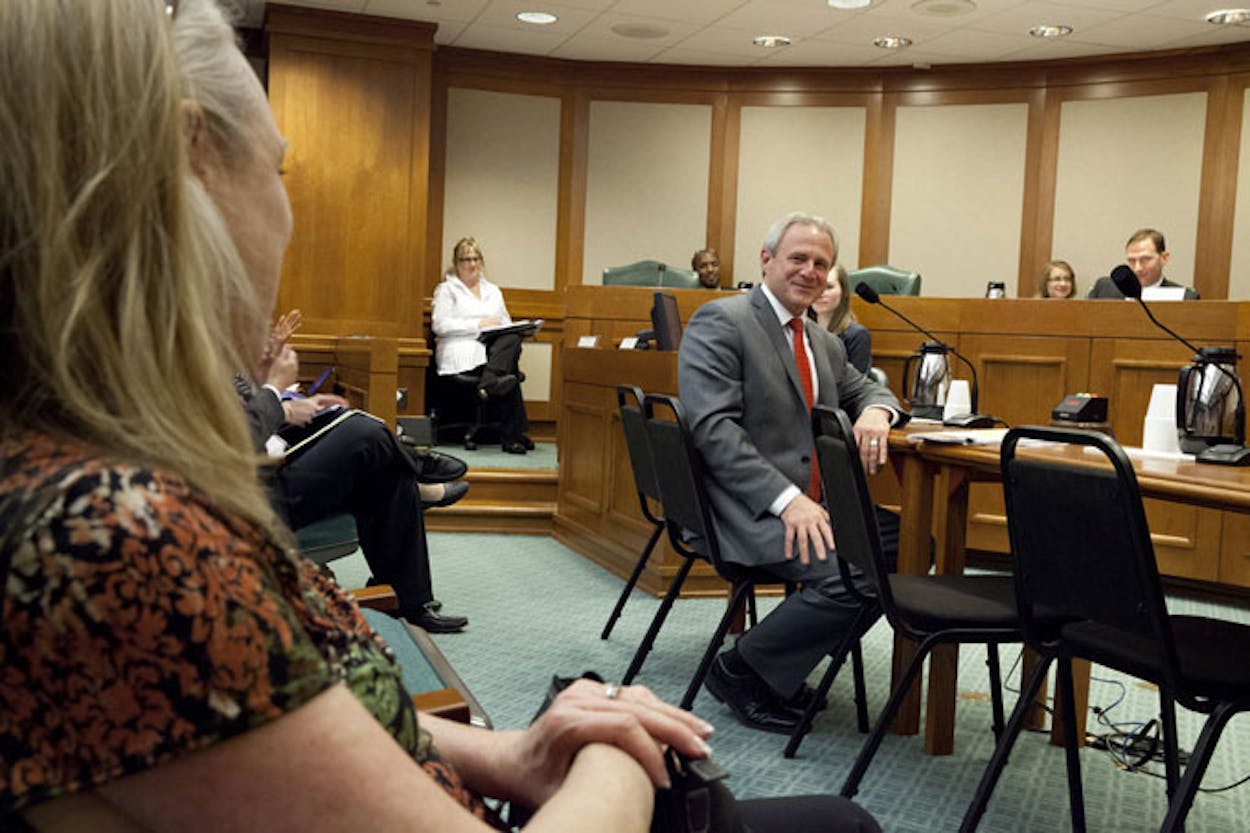A genuinely sweet moment — a relative rarity in the legislative process — took place in the Senate Criminal Justice committee hearing Tuesday afternoon after exonerated inmate Michael Morton wrapped up his testimony to the panel of senators.
“Would you like to introduce your new wife?” Sen. John Whitmire (D-Houston) asked Morton as he finished his four minutes of testimony on Senate Bill 825, Whitmire’s bill that would start the clock on the four-year statute of limitations for prosecutorial misconduct to the date of a wrongfully convicted inmate’s release.
“Last Saturday I married Cynthia,” Morton said, gazing back at his wife happily. When he returned to his seat, those gathered in the packed hearing room clapped as the newlyweds shared a brief kiss. Morton and Cynthia Chessman were married in Kilgore, and the ceremony was chronicled in the pages of the New York Times.
Morton spent 24 years and 11 months wrongfully imprisoned for the murder of his first wife, Christine Morton, before blood evidence found on a bandana at the scene was finally tested, linking another man to Christine’s murder. (That man, Mark Alan Norwood, will go on trial for Christine’s murder next week in San Angelo. Pamela Colloff, who detailed Michael Morton’s saga in a two-part story (Part One & Part Two) in the pages of Texas Monthly late last year, will be filing dispatches from the courtroom.) These have been a busy and emotional few months for Morton. In February, a court of inquiry convened to weigh whether the prosecutor in Morton’s case, former Williamson County District Attorney Ken Anderson, intentionally hid exculpatory evidence from his defense team at trial. And on Monday night, Al Reinert’s documentary on the exoneree premiered at SXSW.
According to the Times, Morton and Chessman met after Morton’s October 2011 release from prison, after Morton spoke about his life in church. Chessman was so moved that she called him at his mother’s house and asked him out for coffee that January, and the romance blossomed from there.
In his testimony Tuesday, Morton stressed that he didn’t want to upend the justice system, but instead hopes the legislature will make “targeted tweaks”—such as SB 825—to bring more “transparency and accountability” into the system to guard against rogue prosecutors. “Most of the prosecutors are good guys, they’re doing the good work that needs to be done—they’re representing all of us. But it happens—there are some bad apples out there,” he said. “And when they step over the line, when they cut corners or break the law … our most fundamental, basic liberties are taken by the very government officials who are instructed to protect us.”
“There’s nothing you can do that will allow me to get back my 25 years—it’s gone and there’s really nothing I can do about it, nothing you can do about it,” Morton said, adding that he is not looking for revenge. “What I am seeking and what I’m asking you to help me obtain is some transparency and most of all, some accountability,” he said.
Whitmire, who has said Morton’s case inspired him to file SB 825, praised him Tuesday for his grace and calm. “You’re a remarkable human being to be here today—rational and fair,” he said. Morton slipped in a reply—”Thank you sir, that’s kind”—before Whitmire continued, “You could be a role model for all of us. I’m certain those lonely nights in prison you never thought ‘Someday I’m going to be a role model for a bunch of Senators,’ but you are. … We get so upset right here because somebody messes with our bills. Somebody messed with your life. And we really can learn from you.”
The bill, which passed out of committee in a 5-0 vote, will now be heard by the whole Senate.
- More About:
- Politics & Policy
- Michael Morton







